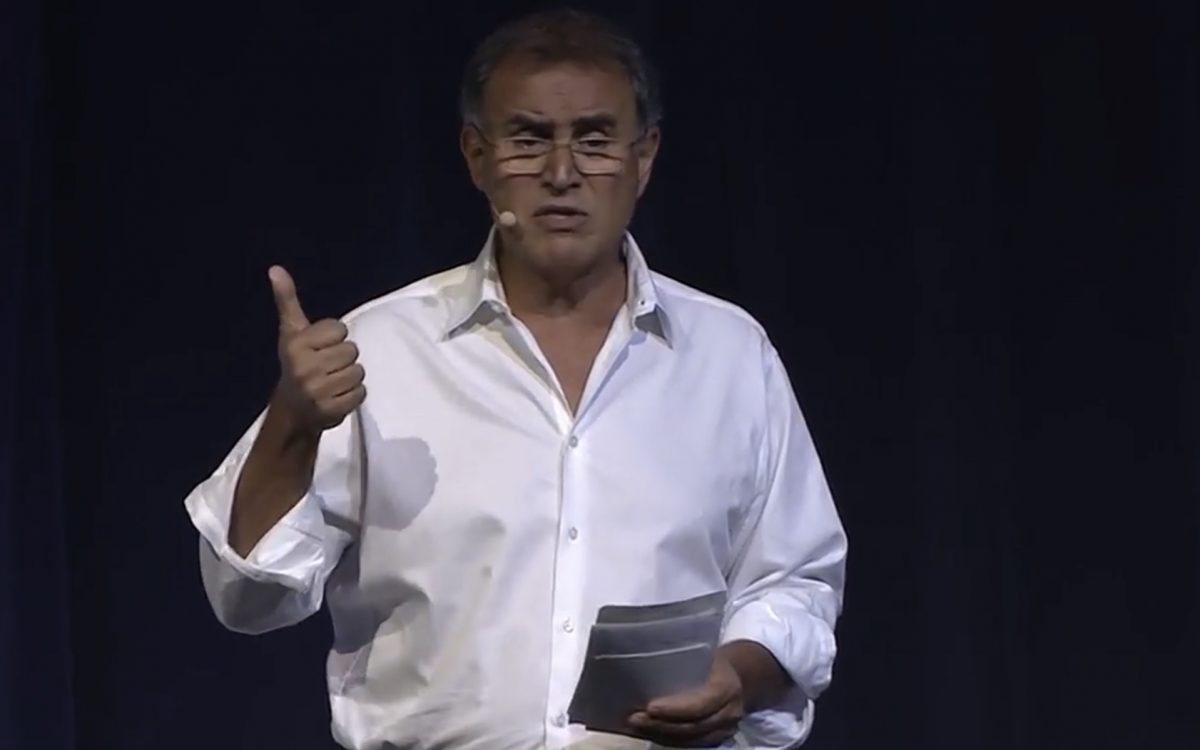Martine Paris (Reporter)
Nouriel Roubini earned the title of Dr. Doom when he correctly predicted the 2008 global financial crisis and became the perennial bear. More recently he made news cryptobrawling with VoIP pioneer Alex Mashinsky at the Milken Institute on the future of money. He has a strong following with nearly half a million Twitter followers, but last week the NYU Professor walked right into a den of HODLers as he spoke sceptically about cryptocurrency and the blockchain at Cointelegraph’s BlockShow Americas.
Roubini’s Cryptopocalypse
Sounding the alarm bells, Roubini warned the audience, “Bitcoin and cryptocurrencies are a bubble that has already burst. Between Thanksgiving and Christmas last year, people with zero financial literacy began buying Bitcoin, and it ran it up from $5,000 to $20,000 before crashing to today’s value, around $6,000. People that bought Bitcoin at the peak lost about 70% but fared better than the average cryptocurrency, including XRP and Litecoin, that have lost on average 92% of their value.” he then added, “81% of all ICOs are scams, 11% are failing or already dead. They are noncompliant securities with no KYC, AML, anti-tax evasion regulation, insurance, or protection of investors.”
He went on to say that cryptocurrencies cannot be considered money as they are not a unit of account, nor a means of payment, nor a stable store of value because of their volatility, and joked that the token economy is more akin to barter as thousands of numerators don’t allow for comparative pricing.
Quoting Vitalik Buterin, creator of Ethereum, Roubini said you cannot have something that is scalable, decentralised and secure at the same time as they’re fundamentally inconsistent. “Proof of work is decentralised and secure but not scalable at 5-7 transactions per second. Visa does 25,000 transactions per second.” He then went on to say that decentralisation was a myth, that exchanges, miners, developers and wallets were massively centralised. That the top 5 miners control 70% of mining in Russia, Belarus and China. and that nearly all transactions are done on centralised exchanges, many illiquid and not secure, citing dozens of 51% attacks.
Roubini called blockchain “one of the most overhyped technologies ever,” arguing that it’s not the new internet, that in the decade it’s been around users have not growing exponentially, the number of transactions have collapsed, and transaction costs are rising through the roof.
“The fintech revolution has nothing to do with Bitcoin, cryptocurrencies or blockchain. AI, machine learning, big data, and IoT are leading to the revolution in payment systems, credit allocation, insurance, capital market activity, and asset management. Digital payment systems used by billions of people and doing billions of transactions a day have nothing to do with blockchain. In China, we have AliPay and WeChat Pay. In India, UPI system and BitPesa in Kenya, in the US we have Venmo, Paypal, Square and dozens of other payment systems that have nothing to do with blockchain or crypto.”
Bitcoin: the last coin standing?
On a later panel with LDJ Capital’s David Drake, Darc Matter’s Sang Lee, YouTuber Tone Vays, Bitcoin.com’s Sterlin Lujan, and BlockAsset Ventures’ David Lee, Roubini admitted that Bitcoin is not a fraud, but that all other cryptocurrencies are. Lujan agreed, citing a Deloitte study, “A good percentage outside of Bitcoin are… sh*tcoins.”
As Vays began discussing Bitcoin as an unconfiscatable asset, Roubini began quoting US. Treasury Secretary, Steven Mnuchin, who said under U.S. law, “if you have a wallet to own Bitcoin, that company has the same obligation as a bank to know. We can track those activities. The rest of the world doesn’t have that, so one of the things we will be working very closely with the G-20 is making sure that this doesn’t become the Swiss bank account.” Roubini added, “Criminals, terrorists and tax evaders use anonymity to commit crimes. Anything digital can be controlled, regulated, and taxed, every penny of it.”
Sang Lee responded, “If they will tax you on every penny, then people will shift to a system where you cannot repossess. In China, everyone with over $100 million tries to repatriate as fast as possible, or buy Bitcoin, which the government tried to stop.”
Lujan added, “Government-issued regulations move at a snail pace, they can’t stop the spread of decentralisation. The authoritarian mindset loses their cool when tech blossoms and thrives. It’s mathematically impossible to freeze someone’s crypto in their wallet. The Bitcoin protocol is highly anti-fragile, it moves, jumps, and improves in response to these attacks. The control mentality will continue as more crypto with privacy features crop up. There will be a beautiful renaissance of freedom with multisig wallets.”
Money is freedom
During his keynote, BTCC’s Bobby Lee shared his views on money as freedom. “We can trust in math. Math will hold up longer than any central bank,” he said, “Bitcoin is not identity based, anonymous is a good thing. Anything that can be tied to anything is not really yours but a digital asset on the blockchain can never be taken from you. Bitcoin is better than the U.S. dollar, it is at no one’s mercy.”
People are not asking for permission
Roubini’s arch nemesis, Alex Mashinsky, founder of Celsius Network, a crypto bank which recently raised $52 million in an ICO, is on a mission to bring the next 100 million people into crypto and was on hand to rebut Roubini.
He exclaimed, “This revolutionary wave of decentralisation will wash away 700 years of concentration of the biggest companies that ever existed, taking back power from corporations that dominate our lives. There are countries that are smaller than Apple. Less than 1% own more than 50% of the wealth in this world. Most people in the world don’t even have a bank account or credit.”
He pointed out the hypocrisy of JP Morgan Chase, Citibank and Bank of America blocking credit card customers from buying crypto on Coinbase yet have employees watching crypto to make sure they jump in at the right time. “Fidelity and State Street are already in behind the scenes and trying to figure out the custody issues.” He talked about the timing of mass adoption of Wall Street of crypto. “During the next financial crisis, people will pull their money out of banks and put it into crypto, that’s when the banks will have to do something.” As for government regulation, Mashinsky commented, “The SEC does a great job of putting the retail investor last in line. I’m an accredited investor and we’re in a private club, if you’re in the U.S. and not accredited you can’t buy into an ICO. You couldn’t get in on Facebook until it had a $200 billion value. The job of the government is not to tell us what’s right and what’s wrong. The job of the people is to tell the government what’s right and wrong.”
Totle’s David Belznak agreed, “Regulations create a small group who can participate and a large group who can’t. The point of tech is to reduce the power institutions have in our economy, shared economies will be administered by software that’s immutable on the ledger.”
Forbes’ Jason Bloomberg, echoing Roubini, cautioned, “The Libertarian ideal of cryptocurrency, where if we had no government we’d be free to do whatever we wanted, without government regulation it becomes a front for criminal activity.”
Is it then just a question of control?
BlockShow Americas gave a lot of food for thought. On the one hand there were the crypto anarchists like Mashinsky, Lujan and Lee that argued for a utopian revolution in self-governance to free the market and free the world. On the other hand there were the sceptics like Roubini and Bloomberg that cautioned against irrational enthusiasm that would only lead to chaos, criminal activity and financial ruin.
During my panel, “Freedom and Transparency in Mass Media,” featuring Forbes’ Rachel Wolfson, TheStreet’s Jordan French, AMTV’s Christopher Greene, Blockchain Guys’ Ivica Simatovic, and RedPen’s RJ Smith, an audience member asked, “When will the institutions realise they do not control the world and all of the people in it?
It pretty much summarised the sentiment and frustration of attendees waiting on the ETF, waiting on the U.S. to loosen its grip on the innovation in the financial markets and blockchain economy.
Greene responded, “They’re terrified. They know it’s the future. It’s where all the money is going, to build the future of tech. It’s going to happen, they just don’t like competition.”
Not intended to be a cryptokitty reference, Simatovic ended with, “The cat is out of the bag.”







